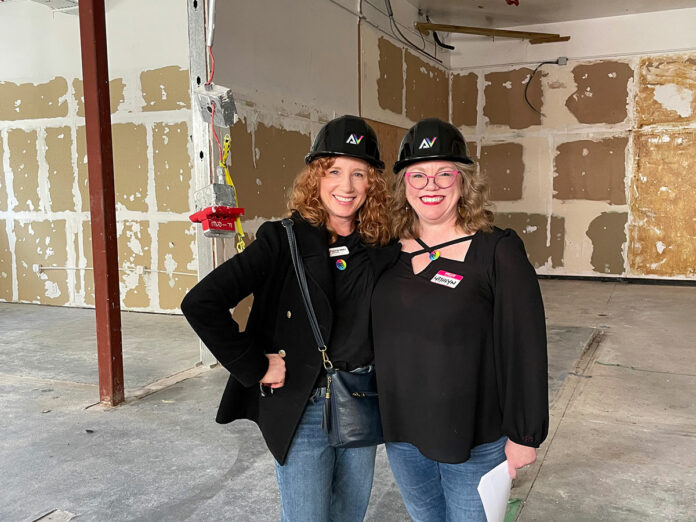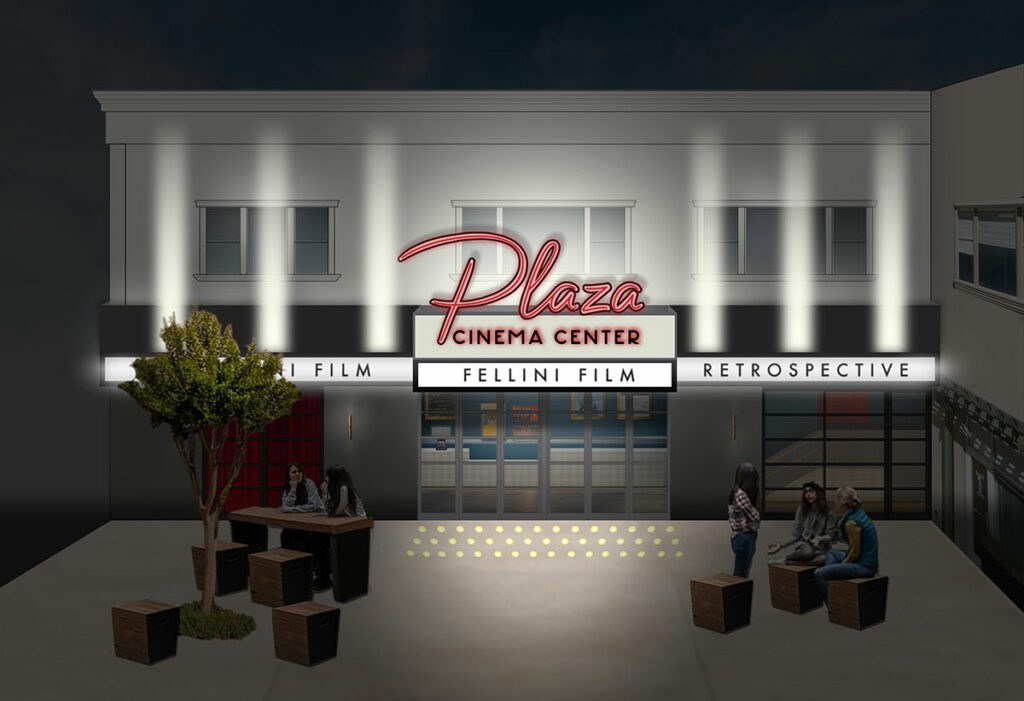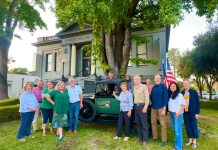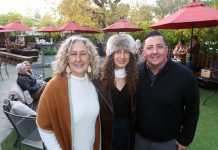
Not all meetings of the Planning Commission are controversial. Sure, some get appealed to the City Council and a few end up in court; many pass a project on to the residents of Healdsburg in the form of higher buildings, more traffic and less parking; and some just approve a fence between neighbors.
And every now and then, a vote by the commission is greeted by a robust round of applause.
Last Wednesday, June 28, the commission held a veritable love fest for an old idea whose time has come again: a movie house in downtown Healdsburg. To be called the Plaza Cinema Center, the three-screen theater will go into the little-used courtyard behind Troubadour and Leaven Sport, in a building at 371 Healdsburg Ave. previously used as a brewing hall by Bear Republic.
The architect’s image of the new theater façade was all it took to sell the concept: a horizontal backlit marquee, and “Plaza Cinema Center” in large red and white script on a dark band surrounding the building. White or colored pillars of light mimic the opening-night klieg lights that signaled a special event at theaters during the heyday of Hollywood movies. Wide folding glass doors allow entry to the lobby, where refreshments including beer and wine can be served to customers in as little as a year from now.

Healdsburg has been without a movie theater since the early days of the pandemic, when the Raven Film Center closed down at first temporarily, then permanently. The main Raven Theater at 115 North St. showed movies until about 20 years ago, when it permanently converted to a performing arts center.
Kathryn Hecht, executive director of the nine-year-old AVFilm (and co-owner of The Clover Theater in Cloverdale), has been eyeing a theater on the lower floor of 371 Healdsburg Ave. for some time. On June 28, she revealed the final plans: a three-screen community movie house, with screening rooms of only 23, 27 and 54 seats—in keeping with the present reality that large screening rooms are too difficult to fill.
The size of the three rooms are small by any standard. Dan Zastrow, who with Don Hyde and Jim Holt opened the Raven Film Center in 1997, said that when it opened only Theater #1 was under 50 seats; the other three screening rooms ranged between 130 and 250.
The new Plaza Cinema will be nothing close to that scale. “The auditoriums are intimate, responding to the changing landscape of movie-going, but still providing the shared social experience of watching the movies with an audience,” Hecht told the commission.
Key to such boutique cinemas is the ability to serve beer and wine, if not food. The Rialto, now in Sebastopol, and Healdsburg’s Raven Film Center were among those that adopted the practice.
Last October, having caught wind of the proposed film center, the City Council amended the code to allow the future Plaza Cinema to serve alcohol, since the location straddles two downtown zones.
“The (cinema) business has evolved over the decades, and naturally theater operators—like any hospitality business—are putting the audience experience first,” Hecht said at the time.
But it wasn’t the opportunity to serve wine at one more place downtown that enchanted the Planning Commission, but Hecht’s evocative pitch.
“We know that lives are positively transformed by shared experiences around film,” she continued. “Sometimes profound, some more subtle, like the memories we have as kids, seeing our heroes on the big screen for the first time, being on a date, or giggling or shrieking with friends.”
Admitting that AV Film first attempted to take over the Raven Film Center space after it was permanently closed in July, 2020, Hecht said that idea didn’t pan out. “The numbers didn’t work at the Raven, and the space was too big for a commercial theater for today’s audiences,” she noted.
Hence the shift to small screening rooms, a more central downtown location, a more efficient building with a low carbon footprint—“a cinema that reflects a contemporary understanding of movies, media and community,” as she put it.
“The smaller screening rooms are more responsive to today’s audiences in Northern Sonoma County,” said Hecht. “They provide state of the art sight and sound while delivering the social element of watching movies, as they were intended, with a crowd.”
Upstairs will be classroom space for education and presentations by the non-profit AV Film, described by Hecht as a “501c3 mission-driven organization dedicated to strengthening the Northern Sonoma County region through film,” an ambitious remit most visibly accomplished by their annual AV Film Fest (the latest was held in early May this year).
“Through fires, floods, a pandemic and social unrest, AVFilm has earned its status as a nimble, socially conscious and implicitly trusted community partner in both English and Spanish-speaking communities,” said Hecht.
The Plaza is slated to be a type of art house cinema that has flourished and faded across the country, only to be in a renaissance today. Designer Tom Rael, a Santa Fe architect who specializes in art house theaters, was also at the meeting, and he referred to an earlier film project of his, The Sunshine in New York City, as the inspiration for his treatment of the theater’s name above the marquee.
Hecht and Rael both said the Plaza would follow a hybrid model, screening “first-run Hollywood content” in two of the theaters, while a third screen would be reserved for “doing more of the art house model, where we would be heavily eventized with independent film,” said Hecht.
Presentation over, Vesna Breznikar, the Planning Commission’s vice chair (chair Phil Luks being absent) called for public comment from both the online and in-house audience. When asking for any negative comments, she was met with silence; and when asking for any positive comments, she was greeted by a loud, sustained round of applause from the 20 or so who showed up for the hearing.
“I think it’s great to have movies back in town,” said Tom Barber. “I’m relatively new on the commission, but I’ve never heard a resounding applause like that yet, so thanks for showing up and being here.”
“You’re not just bringing a movie theater; you’re bringing culture by having foreign films and activities,” said Breznikar. “I’m very happy for you and for Healdsburg.”
Hecht said construction would begin as soon as later this summer, and the Plaza Cinema Center should open in 2024.








